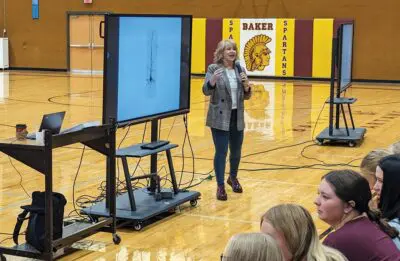
Brain Science Speaker
| Baker Public Schools and the community welcomed a special guest speaker on Sept. 8. Presentations were given by Dr. Crystal Collier, first with Baker/Plevna High School students at 10 a.m. in the McGonigal gymnasium and then another for the community at Longfellow gymnasium later that evening at 6 p.m. Collier discussed some intense topics with those in attendance and gave invaluable information about the brain science of high-risk behaviors and their long-term effects. Dr Collier also spoke at Ekalaka Public School the day prior, for students and community members.
Dr. Collier is a therapist, prevention research educator, and also someone in long-term recovery herself. She has been recognized and awarded for her various efforts in the fields of prevention science and addiction. Some awards include the Torch Bearer Award by the Texas Association of Addiction Professionals, the 2019 Counselor of the Year Award by the Houston Counseling Association, and the Outstanding Research Award from the Association of Alternative Peer Groups. Her presentations and prevention research given to large groups of students and adults emphasizes the neurodevelopmental effects of risky behavior to children, teens, and young adults. Backed by the National Council on Alcoholism and Drug Dependence, her discussions focus on the effects of alcohol, marijuana, technology overuse, pornography, first person shooter games and social media. She also explains brain-based parenting techniques to prevent or treat risky behavior. Dr. Crystal Collier’s visit wouldn’t have been possible without the recommendation and assistance in scheduling by Beth Regan of the Eastern Montana Community Mental Health Center out of Miles City, Montana. Informative presentations like these are extremely beneficial to students, parents, and our communities alike. Attendees left her presentation more knowledgeable and aware of just how quickly the brain can be altered during development in reaction to addiction and risky behaviors involving drug use. The more society understands how this has an impact on our youth, the better we can assist in future prevention, therapy, and treatment options for those who may be struggling.
(This is from a newspaper article in the Fallon County Paper, with an addition including Ekalaka.)
|
